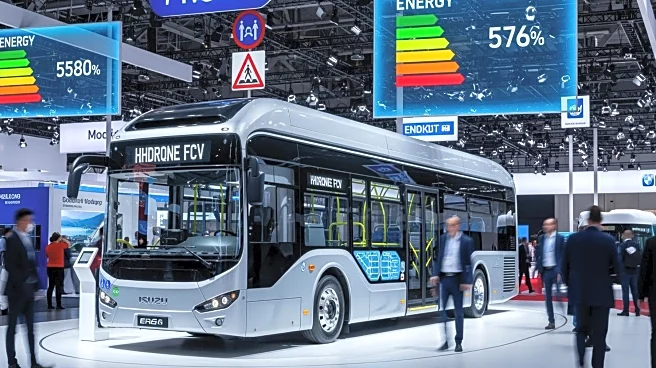What's Happening?
Isuzu Motors Limited has announced the world premiere of its next-generation fuel cell route bus, the ERGA FCV, at the Japan Mobility Show 2025. Developed in collaboration with Toyota Motor Corporation, the ERGA FCV integrates Toyota's fuel cell system
and hydrogen tanks into its roof structure, maintaining a flat-floor design for improved passenger convenience and safety. The bus generates electricity through a chemical reaction between hydrogen and oxygen, powering the vehicle's motor while emitting only water vapor, thus reducing environmental impact.
Why It's Important?
The introduction of the ERGA FCV represents a significant step towards achieving carbon neutrality in public transportation. By utilizing hydrogen as a fuel source, the bus addresses the challenge of long energy replenishment times associated with battery electric vehicles, offering quicker refueling options. This development aligns with Isuzu's mid-term business plan focused on carbon-neutral solutions, highlighting the company's commitment to sustainable mobility. The collaboration with Toyota underscores the importance of partnerships in advancing green technologies and could influence other manufacturers to explore similar innovations.
What's Next?
Following the unveiling, Isuzu is expected to continue its efforts in promoting carbon-neutral transportation solutions. The success of the ERGA FCV could lead to further developments in fuel cell technology and expanded adoption of hydrogen-powered vehicles. Stakeholders in the transportation industry may respond by investing in infrastructure to support hydrogen refueling, potentially accelerating the transition to cleaner energy sources. Additionally, regulatory bodies might consider incentives to encourage the adoption of environmentally friendly technologies.
Beyond the Headlines
The development of the ERGA FCV highlights the growing importance of hydrogen as a viable alternative to traditional fossil fuels. As the transportation sector seeks to reduce its carbon footprint, hydrogen-powered vehicles offer a promising solution. However, widespread adoption will require significant investment in refueling infrastructure and overcoming technical challenges related to hydrogen storage and distribution. The collaboration between Isuzu and Toyota also reflects a broader trend of cross-industry partnerships aimed at driving innovation and sustainability.















